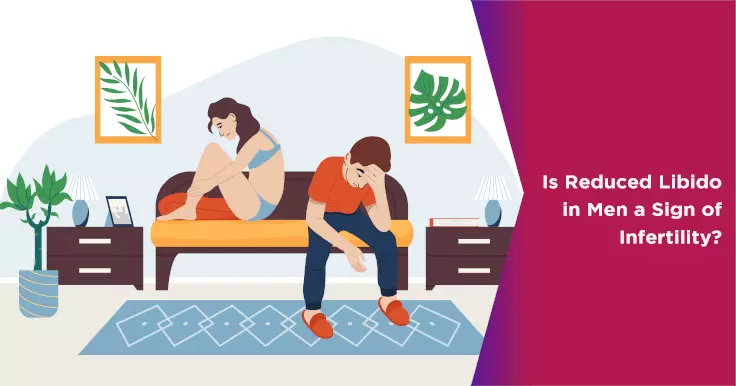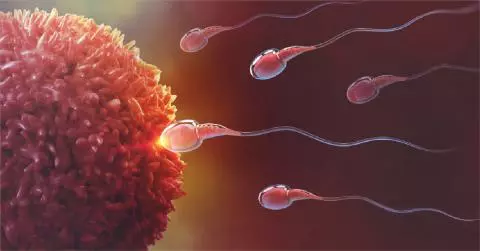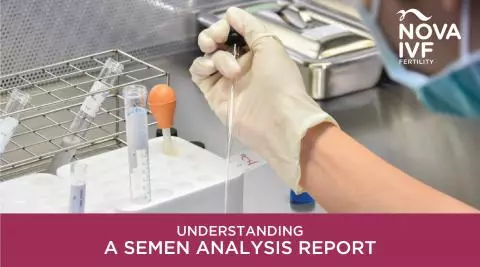Low Libido (Low Sex Drive)

A person's libido refers this desire to have sexual relationships with his partner or sex drive. As you can imagine, if any one person in the couple does not have a strong libido or desire to have sex, it can be very difficult for the couple to conceive. This makes many people ask, is reduced libido a sign of infertility? The answer is both yes and no.
This article explores low libido treatment, causes of low sex drive in men and women, among other things.
What is low libido?
Low libido, also known as low sex drive, is a decrease in the intensity and/or the frequency of your usual sexual desire. This decrease can be temporary and get resolved on its own or be a long-term problem. Low libido does not only impact your desire to engage in sexual intercourse with your partner, but also impacts your desire to masturbate. Sex hormones like testosterone and oestrogen and neurotransmitters like dopamine and oxytocin regular a person’s libido.
Libido varies from person to person, which means that one person may have a greater sexual desire than another. When a doctor performs a diagnosis for low libido, they will compare your previous libido to your current libido. Thus, there is no ‘normal’ libido. If you have low libido and it is causing you distress, it is best to consult a healthcare provider.
Low Libido and Infertility
It is not necessary for a man with a low libido to be infertile. In many cases, low libido is a temporary situation that relieves itself when the factors causing it are addressed. For example, if a couple isn't getting along, the man is likely to have a low libido. But as soon as their differences are resolved, his libido may return to normal levels.
On the other hand, reduced libido can be a sign of hormonal fluctuations such as a drop in testosterone levels. In such cases, it may be accompanied by erectile dysfunction, depression, fatigue and irritability.
Testosterone plays an important role in sperm production. Under normal circumstances, a man's testosterone levels should be between 270-1070 nanograms per decilitre. The most common cause for reduced testosterone levels is age. It may also be caused by lifestyle factors such as obesity, uncontrolled diabetes and injury to the testicles.
Low testosterone levels can be treated with hormone supplements, but this is not advisable for men who want to father children as it can have a detrimental effect on their fertility. Instead, make lifestyle changes such as eating a healthy diet, exercising regularly and quit smoking or drinking.
How common is low libido?
Low libido affects up to 1 in every 5 males during the course of their life and is quite common. In comparison to males, a greater number of females experience low libido at some point in their lifetime.
If you have experienced low libido earlier, it is not uncommon to have low libido more than once in your lifetime. Thus, it is a good idea to consult your doctor if you are experiencing low libido and it is bothering you.
Low libido symptoms
The main symptom of low libido is reduced desire to have sexual intercourse with your partner or masturbate. Other symptoms of low libido can also include a decrease in sexual fantasies or thoughts about having sex. Many people also experience a dissatisfaction if they experience low libido.
People who have low libido may also develop anxiety or other mental health problems.
Low libido causes
There are many factors that contribute to a reduced sexual desire in males and females. These include biological, psychological and social-cultural factors such as the following:
Problems in your relationship
If you and your partner have trouble communicating about your needs and preferences, you are likely to experience low libido. Having trust in each other is also extremely important in order to be intimate with your partner. Many couples also notice a decline in their libido over the course of their relationship.
Extreme Fatigue & Stress
If you are exhausted or stressed due to various factors, including work, family, friends, health, and life in general, you are likely to experience a low libido.
Chronic stress is a culprit that interferes with your hormone levels, which translates to lower libido.
History of sexual trauma
Someone who has experienced sexual harassment, sexual abuse, or rape in their life can experience low libido.
Anxiety disorder
Anxiety disorders are quite common and known to increase cortisol levels in the body, which is also known as the stress hormone. High cortisol levels in the body can suppress the sex hormones in your body and cause low libido.
Depression
Depression causes an imbalance in your neurotransmitters, which are also responsible for regulating your libido. Thus, people who have depression can experience low libido.
Apart from these, you may experience low libido due to the following:
- Excessive alcohol consumption or other recreational drugs
- Smoking
- Infections
- Medication
- Religious mandates or personal believes
- Advancing age
- Personal circumstances
Certain health conditions are also associated with low libido
Low libido in females can be caused by the following factors in addition to the ones mentioned above:
Perimenopause and menopause
The production of oestrogen in the female body decreases significantly during perimenopause and drops significantly during and after menopause. Thus, causing low libido in older women.
Pregnancy, childbirth, and breastfeeding
All of these natural processes lead to a significant change in the hormone levels of a female. Additionally, symptoms during these processes involve a certain degree of discomfort and stress, which can cause low libido in pregnant women or breastfeeding mothers.
Reproductive health disorders
Health conditions, such as polycystic ovary syndrome (PCOS), premenstrual syndrome (PMS), and endometriosis, can negatively impact a female’s libido.
Infections
Certain infections, such as urinary tract infections (UTIs) and vaginal yeast infections, can also lead to low libido in women.
Birth control methods
If a female is taking hormonal birth control medication, she can experience low libido. Contraceptive implants, progestogen-only birth control pills, birth control patch, and vaginal ring are some examples of birth control methods that lead to low libido.
Low libido in males can be caused by the factors listed below in addition to ones mentioned above:
Low testosterone levels
Also known as male hypogonadism, this condition involves reduced testosterone production in the male’s testicles. Male hypogonadism can occur at any age, but testosterone levels of a male decreases with advancing age as well.
Sexual dysfunction
Erectile dysfunction, delayed ejaculation, and premature ejaculation can cause anxiety in a male and ultimately cause low libido.
Low libido diagnosis
Accurate diagnosis of low libido can be a little complex as there are several possible causes of a decrease in your sex drive. Your healthcare provider may ask you the following questions to help with the diagnosis:
- What are your current symptoms?
- Does your family have a medical history of low libido or other reproductive health problems?
- Are you on any medication?
- Are you under any stress or experiencing mental health problems?
- What are your thoughts on sex?
- What is your sexual history?
- Are your experiencing any problems in your relationship?
If your doctor suspects that you may have low libido, they may do further investigation by performing physical exam, blood tests to check hormone levels, pelvic exam, imaging tests, etc.
Low libido treatment
Treatment for low libido largely depends on the cause of the problem. There are several treatment options available for low libido including the following:
Education
By learning about sex, sexual behaviours, and natural sexual responses, you may be able to overcome your anxiety about sexual responses. This may help you initiate an open conversation about sexual intercourse with your partner to discuss your preferences, needs, and problems.
Change of Medication
If a medication is the reason behind your reduced sex drive, your healthcare provider will change your medication and this will most likely help resolve the issue.
Stress Management
This technique has a comprehensive approach to improve your response to different stressors of your life. Stress management can help prevent further decrease in libido or ease your current symptoms. Journaling, mediation, light-intensity exercises like yoga, and other forms of self-care can help reduce your stress levels.
Hormone Therapy
Hormone therapy (HT) balances your hormone levels and can improve your sex drive. Oestrogen therapy and oestrogen-progesterone/progestin hormone therapy (EPT) are the two main types of HT that are used for women. For males, testosterone replacement therapy is given to improve low libido in the form of pills, injections, creams, patches, etc.
Counselling
Individual counselling or talk therapy with a trained professional can help in identifying unhealthy thinking patterns and behaviours and correct them as well.
Your doctor may also recommend couples therapy if they think you and your partner will benefit from it. Couples therapy can improve the quality of your relationship by facilitating healthy communication and promote intimacy.
Sex Therapy
Sex therapy is a branch of psychology that deals with problems related to sex. Your healthcare provider may recommend a qualified psychologist, doctor, or other healthcare professional to help you and your partner deal with low libido.
What to do if I have low libido?
If you have low libido, you are advised to consult a healthcare professional. In addition to the consultation, you can try doing the following to improve your libido:
- Learn more about sex and natural sexual responses
- Communicate openly with your partner about your concerns
- Implement healthy lifestyle changes, including regular physical activity, limiting alcohol intake, avoiding smoking, and eating a healthy diet
- Manage stress and existing health conditions, such as heart diseases
When should I see a doctor?
If you have low libido that is causing you stress or hampering your plans of building a family, you are recommended to talk to your healthcare provider. After taking your detailed medical history, recommending some tests, and noting your symptoms, your doctor will either confirm the diagnosis of low libido or investigate further.
If you are diagnosed with low libido, your healthcare provider may suggest some lifestyle changes, change of medication, and other strategies to increase your libido.
Conclusion
Low libido is a common problem that can be temporary or long-term. The treatment of low libido can vary on the basis of the cause of low libido. You may need to consider counselling, change in medication, stress management, or increased physical activity.
If you are concerned about low libido, consult a fertility specialist from Nova IVF Fertility to help you increase your sex drive and father a child. You can book a consultation online through the official website or call on 08049388781.
 Infertility Counselling
Infertility Counselling Female Infertility Treatment
Female Infertility Treatment Andrology Treatment
Andrology Treatment Fertility Enhancing Surgeries - Female
Fertility Enhancing Surgeries - Female Fertility Enhancing Surgeries - Male
Fertility Enhancing Surgeries - Male Endoscopy Treatment
Endoscopy Treatment IUI Treatment
IUI Treatment IVF Treatment
IVF Treatment ICSI Treatment
ICSI Treatment Advanced IVF Solutions
Advanced IVF Solutions Embryology
Embryology Vitrification Egg, Embryo, Sperm Freezing
Vitrification Egg, Embryo, Sperm Freezing Preimplantation Genetic Testing (PGT)
Preimplantation Genetic Testing (PGT) Donation Program Embryo / Egg / Sperm
Donation Program Embryo / Egg / Sperm Self-cycleTM IVF
Self-cycleTM IVF

 Self-cycleTM IVF
Self-cycleTM IVF










